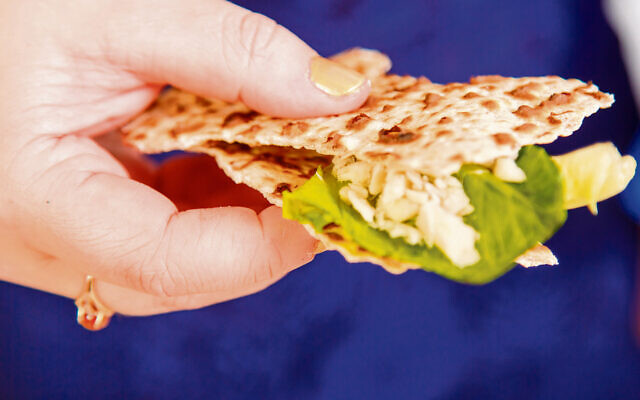At the seder, if it tastes bitter – dayenu
While our lives have been significantly altered and major adjustments were needed throughout this pandemic, they are palpable reminders of how blessed and sweet our universe typically is and just how much we subconsciously take for granted.
THE fact is that in too many homes over Pesach, the maror is not the most bitter thing at the seder table. There are people who suffer from chronic negativity, inevitably dragging others down around them. Interactions become unpleasant, sometimes confrontational, and almost always pessimistic.
New research has emerged identifying how people who inhabit “maror” lives can cultivate more positive emotions and attitudes. A psychologist at the University of North Carolina, Barbara Fredrickson, has developed a theory about accumulating what she coins “micro-moments of positivity”.
She demonstrates that more than a sudden burst of good fortune, it is repeated brief moments of positive feelings that can provide a buffer against stress and depression and foster both physical and mental health.
Growing up, many of us were told to journal or chronicle at least one favourable event that happened during the day. Turns out those early educators were ahead of their time! Recognition of this fosters more positive thinking, in addition to listing a personal strength and noting how it was utilised and setting an attainable goal and recording progress.
If we consciously collate positive experiences, studies show, it will organically eclipse the negative feelings. In other words, have so much charoset that you can’t even taste the maror! One almost didn’t need the research to know we benefit mentally and physically from focusing on positive thoughts.
However, the halachah comes to a different conclusion and with it, a great insight into transforming ourselves from negative to positive people. Yes, we dip the marror in charoset, but we don’t overwhelm or overpower the taste of maror, we specifically eat it to invoke its bitterness.
Almost every Haggadah is bothered by the presence of maror at the seder. After all, it is a night of freedom, joy and celebration, why harp on the negative? Why not celebrate with sweet treats, why with bitter maror?
Rabbi Lord Sacks z’l explains why we eat maror. Within freedom, we are commanded each year never to forget the taste of slavery, so that we should not take liberty for granted, nor forget those who are still afflicted. Others say we eat maror to remember that even post-matzah, post-freedom, there are sour moments in life and they too are part of the tapestry of our world.
Rav Kook wisely explained that we don’t eat the maror to deliberately invoke bitterness, rather, we ingest it to affirm our freedom. Sadly, when a slave is only exposed to bitter foods, the harsh -sustenance becomes the default taste.
Yet in our own lives, when we bite into something awful, a mental alarm sounds and we recoil from its bitterness. We are incredibly fortunate because this indicates that we are not accustomed to that taste, we have not adapted to that as our ongoing reality. Rav Kook reveals that the mere fact we can taste something so bitter is an affirmation of how sweet our lives generally are.
For us Jews in Australia when we sit down at our seder to enjoy this yom tov with family and friends, we will think back to our last yom tov, High Holy Days spent celebrating and praying alone, isolated from our community, and oftentimes family. Shule doors were closed, we blew shofar in the park and davened Neilah in our backyards or on our streets longing for the yom tov we have been accustomed to.
While our lives have been significantly altered and major adjustments were needed throughout this pandemic, they are palpable reminders of how blessed and sweet our universe typically is and just how much we subconsciously take for granted.
The great American football coach Lou Holtz once said, “Life is 10 per cent what happens to you and 90 per cent how you respond to it.”
The (sometimes prolonged) moments of hurt and inconsequential frustration not only alert us that something is momentarily wrong, but they are also a healthy reminder about just how much is right.
We are commanded to eat maror to recall that the horseradish, romaine lettuce (or insert your bitter herb of cultural choice) should be the only negative thing at our table.
If our palate has a sensitivity to this harsh taste, it highlights that we have (on the whole) blessed lives.
For this, we should not only be profoundly grateful, but eternally positive people. So, on seder night if it tastes bitter – Dayenu!
(My thanks to Rabbi E. Goldberg for the inspiration behind these words.)
Levi Wolff is senior rabbi of Central Shule, Sydney.


comments